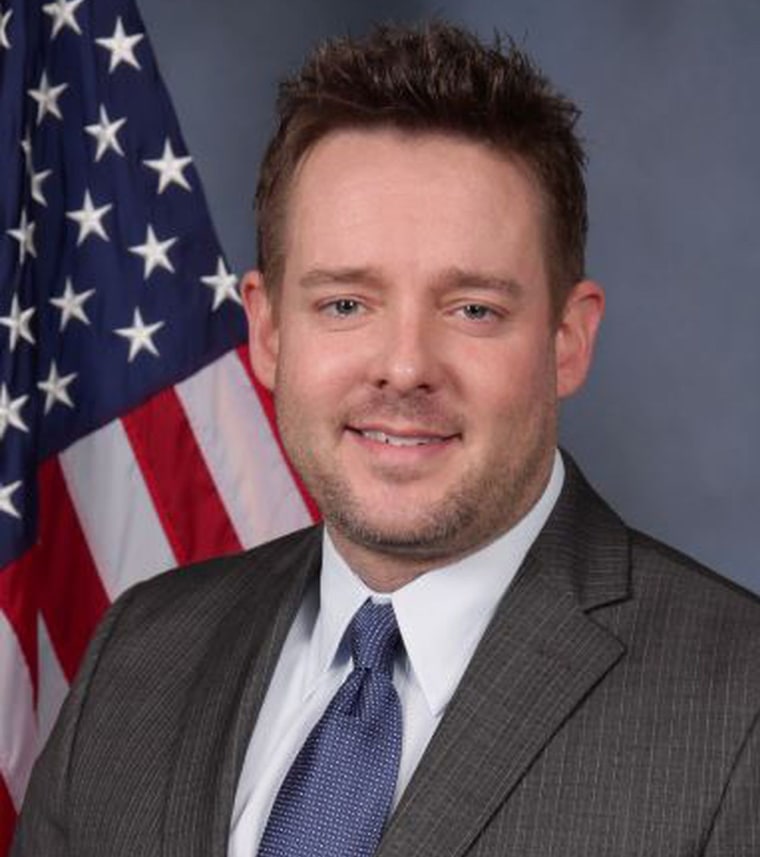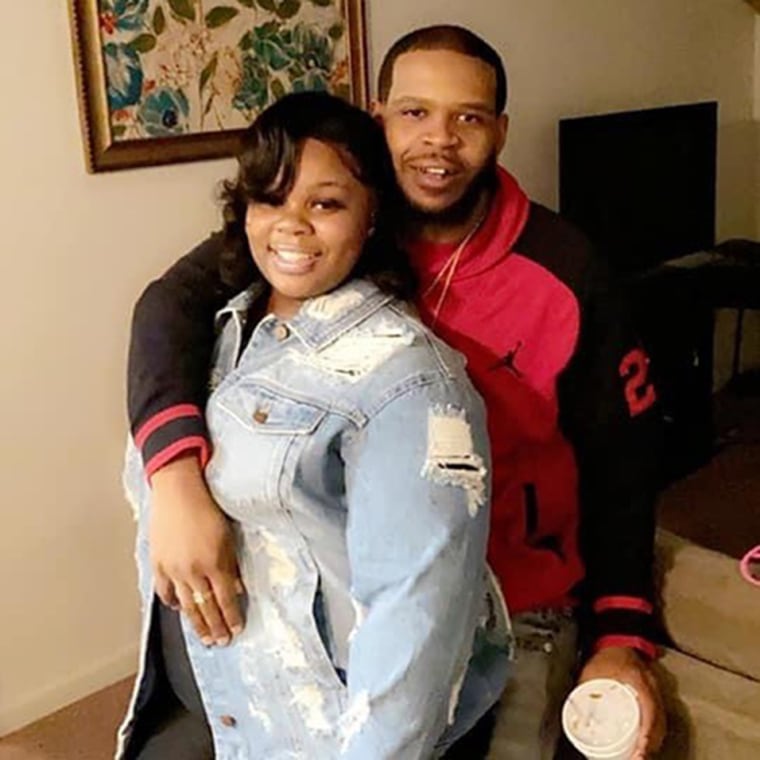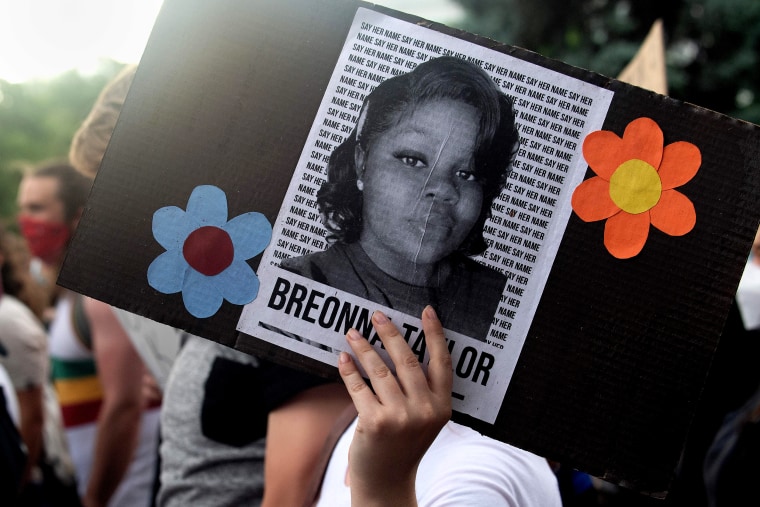LOUISVILLE — Previously unheard audio of interviews from the investigation of the fatal police shooting of Breonna Taylor reveals new details about the events leading to her death, as well as the sympathetic approach investigators took while scrutinizing one of their own.
In the interview with Louisville police Sgt. Jonathan Mattingly, who led the late-night raid in March, the investigator questioning Mattingly describes a raid involving at least seven officers and a battering ram as “the most passive way in” and says Mattingly “rightfully” returned fire after Taylor’s boyfriend Kenneth Walker fired a shot.
In his interview, Mattingly insists officers knocked and announced themselves when they arrived after midnight on March 13. In Walker’s interview with investigators, however, he says there was banging on the door but the couple never heard anyone say “police.” Walker says that after he and Taylor asked who it was and got no response he reached for his licensed firearm.
Taylor, a 26-year-old Black emergency room technician, died after she was hit at least eight times during the ensuing shootout.
Police were executing a search warrant in a drug investigation, but Walker's attorney says they found no drugs in Taylor’s apartment. Experts and local officials have questioned the veracity of the information police presented to obtain the warrant for the search, and its execution.
The timing of the recorded interviews by the Louisville Metro Police Department’s Public Integrity Unit also raises questions about the approach police took to interviewing crucial eyewitnesses.

Sgt. Mattingly’s interview occurred nearly two weeks after Taylor’s death with a lawyer present.
Walker was interviewed just hours after the shooting. He waived his rights to an attorney and emotionally recalled the chaotic night, saying he shot once at what he believed was an intruder before officers opened fire. Days later, the 27-year-old was indicted for attempted murder of a police officer and assault.
Prosecutors dismissed charges against Walker after Breonna Taylor’s name became a rallying cry at national protests against the police killings of Blacks. The Kentucky Attorney General’s office and the Federal Bureau of Investigation are examining the case.
No charges have been filed against the three officers who fired their weapons that night. Taylor’s family has filed a wrongful death lawsuit against the officers. One officer has been fired.
Much of what happened that night remains murky, in part because Kentucky law bars government officials from discussing ongoing investigations of police officers.
NBC News contacted the Louisville mayor’s office, the police department, the city’s police union and attorneys for the officers who fired their guns, including Mattingly. All either declined to comment or did not respond.
Portions of these interviews were released by prosecutors in late May, but entirety of the interview audio turned over to prosecutors by police, provided to NBC News by Walker’s attorney, has not previously been heard. NBC News is posting both the complete recordings and four excerpts from the interviews. Mattingly's interview runs 40 minutes, while Walker's is 98 minutes. Walker's interview was twice interrupted, and was provided to prosecutors in three parts, which NBC News has combined into one audio file.
Click here to listen to the complete Mattingly recording.
Click here to listen to the complete, combined Walker recording.
A ‘soft target’
At 12:40 a.m. on March 13, police arrived at St. Anthony Gardens, the leafy apartment complex where Taylor lived. Documents show police suspected she was stashing drugs for a friend allegedly involved in a narcotics ring. She had no drug history or criminal convictions.
A judge signed the search warrant in part because police claimed a postal official had confirmed the target of the investigation received packages at Taylor’s home. But a U.S. postal inspector later told WDRB there were “no packages of interest” sent there. The postal inspector did not respond to a request for comment from NBC News.
Though it has been widely reported that police executed a “no-knock” warrant, even leading to a new Louisville law banning such warrants, both Mattingly and Walker say police did bang on the door that night. They also agree that Walker fired first.
After that, their accounts diverge.
Mattingly confirms police considered Taylor’s home a “soft target” with no animals or children and that they anticipated “no threat.” That’s why, he says, they knocked. He says he knew few other details.
“Do you remember the name on the search warrant?” the investigator asks.
“Not offhand,” he responds. That night’s raid, headed up by another unit, “was a heavy manpower operation,” he adds. “They just needed bodies.”
Mattingly tells interviewers that an officer staking out Taylor’s house told him Taylor was home alone watching television. A blue light flickered in the bedroom window as the team approached in plainclothes and tactical vests, says Mattingly.
His team clustered in the breezeway outside the apartment. He recounts that they knocked twice, then started knocking again and yelled “Police, search warrant!” The knocking lasted 45 seconds, Mattingly says, enough time for “the average person, or even a disabled person” to answer. Then the team rammed the door.
In his interview, Walker tells investigators he and Taylor were dozing in front of a movie in the bedroom when they heard loud banging. They shouted “Who is it?” he says, but got “No answer. No response. No anything.”
They scrambled to dress and Walker grabbed his licensed gun, he says. They were standing in the hallway when the door opened in an “explosion.”
Walker maintains he could not see who was breaking in, saying he fired one low “warning” shot because he thought it was an intruder.
Mattingly says he got all the way into the house and saw Walker pointing the gun. He heard Walker’s shot and returned fire immediately. Mattingly had been hit in the leg, and would later learn the bullet had punctured his femoral artery. Walker did not fire his weapon again.
Police fired at least 16 rounds that night, according to records and Mattingly’s interview. Walker’s attorney said police shot at least 22. At least 10 came from Sgt. Brett Hankison, who has since been fired for “wantonly and blindly” firing into the apartment, according to his termination letter.
Bullets pierced walls in a bedroom, the living room, bathroom and kitchen. Some flew into the apartment next door, where a young pregnant mother lives with her partner and child, shattering their patio door.
Eight shots struck Taylor, according to her family’s lawyer.
As he interviews Mattingly, Sgt. Jason Vance describes the officers’ approach as “the most passive way in to serve the warrant.”
Critics say executing a warrant at 1 a.m. with a battering ram is inappropriate for a low-threat location.
“It’s unbelievable to me given that this is a ‘soft target,’” said L. Song Richardson, the dean of the U.C. Irvine Law School and an expert in constitutional policing. “Did they think she had a gun or was this all because they thought she might flush the drugs down the toilet? If so, that seems to be inconsistent with knocking and announcing.”
The interviews raise the possibility that the police did announce, and Walker and Taylor did not hear them.
“It’s conceivable both sides are telling the truth,” said Christopher Slobogin, director of Vanderbilt Law School’s Criminal Justice Program.
But Slobogin says the crux of the case rests on the warrant that brought police to the door.
He questions the “boilerplate” language police used to obtain the “no-knock” warrant, which he said does not meet constitutional standards. That could throw the force police used that night into question, he said.
Five warrants related to the drug case, obtained for different addresses, used virtually identical language, including the warrant for the search of Taylor’s apartment, and ended with a request for “a No-Knock entry to the premises due to the nature of how these drug traffickers operate.”
“Even if you’re justified in using deadly force, if you were the one who was wrong in the first place, you don’t get to use justification,” Slobogin said.
'We're here just to try to find out what happened’
The arm of the LMPD charged with determining whether a police-involved shooting is justified is the Public Integrity Unit, which recorded the interviews obtained by NBC News.
At 4 a.m., hours after the raid, PIU Sgt. Amanda Seelye introduces herself to Walker.
She and her colleague Sgt. Chad Tinnell explain to a tearful Walker that their team is like “internal affairs.”
“We investigate officer-involved shootings,” Seelye says. “We're here just to try to find out what happened.”
“I’m scared about what to say,” Walker says.
She encourages him to sign the Miranda rights waiver and talk.
“It would be good for you to sign this and then we can get you, get your statement and then we can leave you alone,” she tells Walker. He’s compliant, later also providing his iPhone passcode when Seelye asks for it.
Six days later, Seelye testified before the grand jury that indicted Walker. In a two-minute statement, she described the shooting but did not tell the members of the jury that Walker thought the noise at the door was an intruder.
Seelye interviewed Sgt. Mattingly on March 25, 12 days after the fatal raid and six days after Walker was indicted.
On the audio of the interview, as Seelye listens, Sgt. Vance steers Mattingly through the moments of the shooting, at times suggesting answers.
Vance asks Mattingly if he immediately dropped to the ground after Walker shot him in the leg. Mattingly says no — he fired four times at Walker, backed out of the apartment, fired twice more, then “got out of the game,” he says.
“That's kind of like what I was getting to because of your positioning, you know, initially when you're shot — and then rightfully so, you're returning fire,” says Vance.
“Mm-hmm,” Mattingly responds.
“But you know you just said you made a conscious decision, you know, ‘I'm now injured I need to move, so they can protect themselves and me as well,’” says Vance. “And then — I don't want to put words in your mouth ...”
“No, that's it,” says Mattingly.
Vance also offers that the apartment’s layout made it a “difficult” location.
“You've got to nearly 20 years of police experience, would you, would you say that the positioning of that apartment, made it extremely difficult?” asks Vance.
Mattingly replies, “It wasn’t ideal.”
Geoffery Alpert, an expert in high-risk policing and use-of-force, described the interview with Mattingly as “leading.”
“The point of an interview is getting unbiased information, and that's not what he's doing,” said Alpert, a criminologist at the University of South Carolina. “The questions are so leading, they’re basically giving him as much information as they're getting.”
Tyler Izen, a retired supervising detective in the Los Angeles Police Department and former union president, said it can be problematic to have the same officers investigate both whether police used excessive force and the actions of a suspect who harmed an officer during the same incident.
Many departments investigate police-involved shootings as “one big incident,” but Izen said it’s better to have separate teams.
In Los Angeles, three independent entities run parallel investigations. An administrative team determines if the officer broke policies. A second unit examines if the officer used excessive force and should face criminal charges. A third investigates the actions of the suspect.
Each team presents findings to prosecutors, who determine if charges should be filed.
It takes resources, but Izen said separating the investigations helps to maintain public trust.
“If you get three days into it and you realize the officer did something pretty significantly wrong, it’s hard to come back and recreate that criminal investigation and clean it up,” he said.
Fired officer was ‘worked up’
Mattingly was among four officers reassigned after the shooting. Only one has been fired: Officer Brett Hankison.
Hankison was “a little bit worked up” that night, Mattingly says in the taped interview, arguing with and pointing his gun at a neighbor who was objecting as police banged on Taylor’s door.
“I remember looking at Brett saying, ‘Brett, relax,’” Mattingly says. “‘That's not your focus.’’’
In the firefight, Hankison shot 10 times through a curtained patio and window, bullets flying into neighboring apartments. His termination letter says Hankison showed “extreme indifference to the value of human life” and violated the rules against using deadly force.
Mattingly tells investigators he never saw other officers shoot — but after he had exited the apartment, gotten through the breezeway and stumbled to the curb, he says he heard gunfire.
Neighbors who called 911 that night described hearing “reload” and a second round of gunfire. Mattingly’s statement appears to corroborate that there were two separate rounds of shots. Attorneys for Taylor’s family claim in court papers that Hankison was the one who yelled “reload.”
Hankison's attorney declined to comment.
‘A misunderstanding’
When the shooting stopped, says Walker in his taped interview, he saw Taylor on her stomach in the hallway.

“I’m yelling for help,” he recalls. He still didn’t realize the intruders were the police, he says, because “nobody was, like, rushing in after all this happened.”
He explains why he fired his weapon, asking the officers if they wouldn't have done the same. “It's the middle of the night. Somebody is beating on the door and not saying who they are ... What are you going to do?"
"I know y'all have guns at home. You're going to grab it and be cautious like, 'Okay, so what's going on?' You're creeping towards (the door) ... 'Who is it? Who is it?' You don't know who it is and then the door flies open?”
After the shooting, Walker called his mother, he says, then 911, pleading for paramedics.
An ambulance was on stand-by for the search warrant, which is standard procedure, but the response was bumbled.
Officers were initially unable to locate the paramedics as they fumbled to put a tourniquet on Mattingly’s leg. Officers put him in the trunk of a car to get him to an ambulance at the complex’s gate.
It’s unclear when paramedics attended to Taylor.
After Walker called 911, he told investigators he heard the police yelling at him to come out.
As he backed out of the apartment, arms raised, he says an officer holding a dog told him, “‘I’m going to let this dog on you, you’re going to jail for the rest of your life.”
He says the officer asked, “‘Did you get hit by any bullets? And I'm like, ‘No.’ He said, ‘Oh, that's unfortunate.’”
On hearing about the officer’s alleged statement, Tinnell, the police interviewer, tells Walker, “That’s not appropriate.”
Walker then describes a strange interaction as he was being driven to the police station in a police car. A silver SUV pulled up alongside, he says, and a plainclothes official came to the window and told him that there had been a “misunderstanding."
“Why’d he say to me that there was a misunderstanding?” Walker asks Seelye.
“I don’t know,” she says. “That’s some new information for us as well.”
“'I’m not an idiot,” Walker says. “They figured out something. They did something wrong.”
State and federal agencies are investigating whether Louisville police committed any crimes or civil rights violations that night. Walker is currently free, but could be re-charged.
“We are trying to get the charges dismissed with prejudice, so this will not remain on his record,” said Rob Eggert, Walker’s attorney.
At around 5 a.m., Tinnell escorts Walker to the bathroom. The officer asks Walker if he has any injuries or bruises.
Walker volunteers only one: “My heart.”
“Your heart?” Tinnell responds. “I wish I had something for that, man.”
Lisa Riordan Seville reported from New York. Andrew Blankstein reported from Los Angeles.
